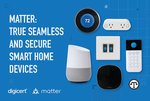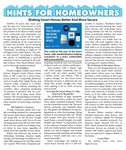

(NAPSI)—If you’re like many people, the idea of a “smart home” is both enticing and a bit intimidating. There’s the promise of an ideal in which simple voice commands and automation can set the lighting, activate the air conditioning, and play music on demand. In reality, setting up all the many devices to make this possible can be daunting due to one primary underlying reason: “Standards,” according to DigiCert VP of Digital Trust, Mike Nelson. “Or, rather, lack thereof.” According to Nelson, the answer is establishing a catch-all standard in device-making for all available vendors. Now, there’s Matter, which can be this long-awaited standard.
The Problem
Despite roughly a billion smart home devices shipped yearly, Nelson claims there is still a need for a device interaction protocol. Competing platforms, such as Google Nest, Apple Home, and Amazon Alexa, contend in a chaotic market. This is without including the countless other companies producing all manner of products that are compatible with all of these smart home systems. The varying degrees of interoperability are further complicated by the sheer number of control apps coming to market.
The Industry’s Answers
To help consumers, there’s now a single overriding standard for interoperable and secure smart home solutions. Imagine being able to use all your Google smart home devices with Siri or all your Samsung smart home devices with Alexa. Now, you can control every Matter-trusted device in your home, regardless of brand, from the controller of your choice.
Matter has attracted big names in technology, including Amazon, Apple, Google, and Samsung, in addition to another 300 companies on a list that continues to grow. With these companies participating, hundreds and soon thousands of devices will carry Matter certification.
“Any product with a Matter logo will work simply, seamlessly and securely with any other product with a Matter mark,” says Nelson. “This is a game-changer for the smart home landscape because it addresses the one thing that people struggle the most with—getting it all to work correctly and securely.”
Securing the Smart Home Is a Big Deal (Or It Should Be)
The proliferation of apps, standards, approaches and devices makes the smart home setup a potential headache. Worse, it is also a potential security risk. The more devices, protocols, and standards there are, the greater the likelihood of misconfigurations or other shortcomings, letting hackers in and personal data out. “While most people won’t give security in the smart home a second thought, you really should,” says Nelson. “Compromises, such as the infamous example when a hacker took over a baby monitor and broadcasted threats, can and do happen, and beyond being enormously annoying and invading privacy, a breach could also cost a consumer financially.”
Smart technology has helped increase home security, but it is still vulnerable to hackers. Headlines featuring cybercriminals hacking into smart home devices and victimizing unsuspecting families are still too common. Home monitoring systems and smart door locks can be compromised.
“With Matter, you finally have devices that will work together with security. Matter-compatible devices are built with a set of security and privacy best practices, including device identity validation, secure communications and software integrity verification. This lets devices communicate within your home and over the Internet, away from a hacker’s prying eyes,” assures Nelson.
The Evolution of the Smart Home
Have you felt disappointed by your first forays into smart home technologies? Many others have, too. Matter promises a vital evolution of the smart home to meet expectations and provide products that are as easy to buy and use as traditional gadgets. As more and more manufacturers adopt Matter, you won’t have to worry if a particular smart bulb works with whatever is already in your home, or if the coffee machine needs its own app. When you see the Matter logo on devices, you know it has met the requirements to be Matter-trusted and will connect to other devices seamlessly and securely. Matter offers this promise for the future.
Because Matter employs software standard protocols, most devices will receive a software update for existing devices to the standard protocols. For instance, Apple released iOS 16.1 in 2022, which contains the Matter update. Numerous devices are already on the market with Matter support and many more are expected to support Matter in the future.
Learn More
For further facts, visit www.digicert.com.